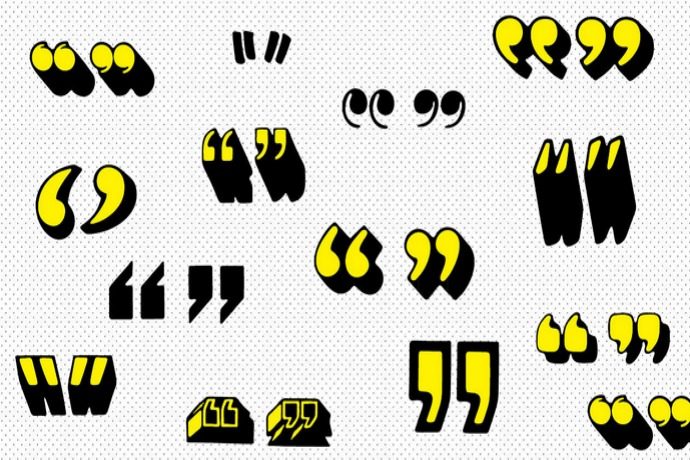As a seasoned editor and journalist who spent her career reporting on marginalized communities, I’m generally wary about the use of so-called scare quotes in writing intended for a broad audience. Placing a legitimate phrase or concept in quotes is the textual equivalent of adding air quotes and rolling one’s eyes—like when we talk about Donald Trump’s support for so-called traditional marriage. (He’s such a proponent of the Biblical definition of marriage he’s been married three times, after all!)
This simple piece of punctuation casts doubt on the validity—or even the very existence—of the subject in question, signaling to readers that they should be skeptical of any explanation or justification that follows. And as a queer woman who has seen her “lifestyle” erased by the use of scare quotes, I’m sensitive to the dismissive tone this grammatical device conjures. I know what it feels like to have a central aspect of your identity boiled down to one throwaway phrase that devalues all that you hold dear.
But the cold, hard truth is that sometimes scare quotes are warranted. Particularly when they are placed around phrases that have been co-opted to serve as an ideological bludgeon—as is so often the case with complaints about violations of religious liberty. Because, to hear most right-wing American pundits tell it, “religious liberty” is the only weapon left for the faithful to stop the sinful advance of LGBT equality, in particular.
“The phrases ‘religious liberty’ and ‘religious freedom’ will stand for nothing except hypocrisy so long as they remain code words for discrimination, intolerance, racism, sexism, homophobia, Islamophobia, Christian supremacy or any form of intolerance,” wrote Martin R. Castro, Chairman of the United States Commission on Civil Rights, in his closing remarks on the commission’s recent 300-page report on “Peaceful Coexistence” between nondiscrimination principles and civil liberties.
“Religious liberty was never intended to give one religion dominion over other religions, or a veto power over the civil rights and civil liberties of others. However, today, as in the past, religion is being used as both a weapon and a shield by those seeking to deny others equality.”
Indeed, if we are discussing the abstract concept of religious liberty — the kind guaranteed by the First Amendment to the U.S. Constitution — it’s hard to justify scare quotes. Even the federal Religious Freedom Restoration Act (RFRA) came into being through what appeared to be a sincere effort to protect the religious rituals and traditions of marginalized faith communities broadly speaking. In what is, by today’s standards, an inconceivable display of bipartisanship, a nearly unanimous Congress approved the federal RFRA in 1993 as a response to a Supreme Court decision that upheld the firing of two Native Americans who lost their jobs as drug counselors after using peyote during a religious ceremony.
But modern iterations of this type of legislation (See: Indiana, Arkansas, Mississippi) have changed the RFRA game. This new framework shifts RFRA’s intent from remedying an actual injury, to instead serve as an enforcement mechanism for the socially conservative understanding of law and, most crucially, sexual morality. (The question around what extent Congress should be legislating our bedroom behavior is another beast entirely.)
This new, mutant form of “religious liberty” does indeed deserve scare quotes. When Mississippi lawmakers overwhelmingly passed a law that determined what kind of intimate relationships are worthy of protection, they also lost the ability to claim that they were seeking to protect faith-based views broadly speaking. Laws like this have less to do with making sure people can freely practice their faith—they are written to privilege one ideological perspective over all others. And that, as it turns out, is a clear violation of the Equal Protection clause of the Constitution, as out attorney Roberta Kaplan successfully argued to block a pivotal portion of that Mississippi law, which allowed county clerks to refuse to sign marriage licenses for same-sex couples.
Setting aside the presumption that a religion claimed by roughly 70 percent of Americans could reasonably be “under attack,” these efforts to protect what’s not in danger quickly reveal themselves to be a dying gasp of “the losers in the culture war,” according to Jacob Lupfer at Patheos. Statistically speaking, that’s a reasonable characterization, as Americans are becoming generally less religious across all demographics, according to Pew.
But it’s not just individual legislators or governors who’ve jumped on the religious freedom bandwagon. The term has become a buzzword for the right wing, fomenting a well-organized (and even better-funded) campaign to roll back recent progressive legal gains. “Sincerely held religious belief” remains a sacred term within this movement—and is unleashed most viciously in opposition to LGBT equality, whether that’s marriage equality, equal access for transgender people, or the right not to be fired for who you are.
The right-wing legal powerhouse Alliance Defending Freedom (ADF) is forthright about which particular religion’s freedom it looks to defend through its aggressive litigation and lobbying. “As secular forces chip away at our nation’s Judeo-Christian roots, religious freedom is increasingly threatened,” ADF writes on its website. A person’s faith, ADF says, is “more than where you worship on Sundays. It’s who you are, and it influences the way you live every day of the week.” (Of course, only one half of “Judeo-Christian” America worships on Sundays, but ADF isn’t very subtle about which half it privileges in its other statements.)
Notably, the staunchly anti-LGBT group that has helped draft many of the transphobic “bathroom bills” apparently doesn’t believe that transgender people’s authentic gender is “part of who you are,” since the organization continues to invest substantial resources into making sure transgender people are barred from using the bathroom that corresponds with their gender identity.
Despite the frequent complaints of self-proclaimed Christian organizations, the “LGBT rights vs. religious freedom” dichotomy wasn’t created by LGBT activists. Early in the fight for legal marriage equality, activists made clear that they were seeking civil marriage licenses, not faith-based approval of their unions (although some faith communities readily provide that approval). While Liberty Counsel, Alliance Defending Freedom, and the Becket Fund continue to shriek about the disintegration of the rights of Christians in the public sphere, no marriage equality law anywhere in this country has ever forced a clergy member to perform a wedding that contradicts their sincerely held religious beliefs.
In fact, since there are those whose “sincerely held religious belief” calls them to embrace LGBT people, to welcome them into their faith communities, and to fight for their equal rights, the proposed Equality Act could be re-branded as a defense of religious liberty—because there are pious Americans whose faith dictates that everyone should be treated equally, and not punished for who they are. (Something about a Golden Rule?)
Religious freedom is indeed a central tenet of American democracy. The freedom to worship how, when, and whom you wish has long served as a cornerstone of our culture, and has helped to facilitate the ideological melting pot that is the United States.
But when freedom of religion is used as a weapon to infringe on civil liberties—especially in the public square—it deserves the scare quotes that the Chicago Manual of Style says are “used to alert readers that a term is used in a nonstandard (or slang), ironic, or other special use.”
At the very least, the clearly coordinated and targeted effort to rebrand the freedom to discriminate as “religious freedom” meets the Oxford English Dictionary’s criteria for the use of scare quotes (emphasis mine):
Quotation marks used around a word or phrase when they are not required, thereby eliciting attention or doubts.
Increased attention and elevated skepticism are precisely what is required of claims that suggest “religious freedom” cannot exist in harmony with LGBT equality.





